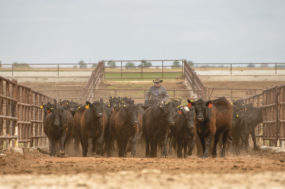For cattle operations of any size, the “documentaries” churned out by undercover animal rights activists can be intimidating – marked often as they are by deceptive editing, scary music, jarring visual effects and anguished voiceovers rife with half-truths and outright lies.
Meant to shock and sensationalize, these videos are also becoming more commonplace: In the past eight years or so, activists have released some two dozen of these putative exposés in 10 states.
Indeed, groups such as People for the Ethical Treatment of Animals (PETA) and Mercy for Animals appear to have been emboldened by the power of social media to influence public opinion and, ultimately, disrupt markets.
In the era of YouTube, Twitter and Facebook, activists no longer have to cross their fingers and hope the likes of CNN will pounce on their footage, which now has the potential to “go viral” and reach huge audiences with or without the help of mainstream media.
Fortunately, these trends cut both ways – or at least they can, so long as animal agriculture businesses take full advantage of the same tools their would-be detractors are so adept at exploiting.
Know your labor
Armed with little more than a laptop, today’s employers can conduct highly revealing research on prospective hires. A quick glance at the candidate’s roster of Twitter friends might reveal multiple members of PETA or other activist groups.
The candidate’s gmail account might be subscribed to three different YouTube channels known for pushing undercover footage shot at zoos, dairy farms and cattle ranches.
The job-seeker might be a regular contributor to animal-rights blogs and forums or a vegan “troll” who constantly taunts and argues with people on websites promoting meat consumption.
A Google Images search might even turn up a snarling photo of the would-be undercover videographer clutching a protest sign scrawled with the words “Stop Factory Farming Now!”
And yet employers in animal agriculture are often hesitant to embrace such aggressive tactics. Quite possibly, they fear a backlash: Anything that smacks of an invasion of the employee’s privacy, the thinking goes, could in itself trigger liability.
But such fears are wholly unfounded for employers in the vast majority of states, where prevailing “at will” employment rules mean that agriculture businesses can hire and fire anybody for nearly any reason (so long as the decision is not the result of prejudice based on race, national origin, gender, sexual orientation or religion).
Quite literally, an Indiana Pacers fan could fire an employee for showing up in an Atlanta Hawks jersey. This might not be fair, but “at will” rules mean it would be perfectly legal.
Animal rights activists, in other words, are the farthest thing from a protected class. Employers have every right to ask job-seekers about their involvement in or support of organizations such as PETA or Mercy for Animals.
And they can and should make use of today’s impressive search capabilities to ferret out potential undercover activists, many of whom have been posting on the Internet in various ways since they were in junior high school.
Activists understand this, which is why the savvier ones will frequently provide a pseudonym to the employer. But here, too, research can turn up red flags. If the employer can find no record of the candidate – no Twitter posts, no Facebook pages, no trace of the kind of track record that most humans tend to leave on the Internet these days – the employer should proceed with caution.
Protect your information
Likewise, agriculture employers often fail to take the important defensive step of requiring that employees sign a well-drafted non-disclosure and confidentiality agreement.
These documents, which should include a prohibition against taking or distributing photographs or videos of any aspect of the employer’s operations, can make it easier for employers to go after undercover activists who violate the agreement. This is true even in cases where the activist was hired under a pseudonym.
But just as employers in animal agriculture are often reluctant to ask tough questions of job-seekers, they also hesitate to fight back against activists in aggressive ways. And yet these forces are hell-bent on ruining their businesses and will use questionable methods toward that end.
Particularly in cattle and dairy, the videos produced by undercover activists tend to be highly deceptive: Clips from multiple operations might be spliced together and portrayed as having come from the same place; perfectly legal, commonplace procedures might figure prominently in a video, as though such acts amounted to egregious violations of animal cruelty laws.
Indeed, activists can rarely show any kind of statutory violation. Their goal is to try the industry in the court of public opinion, not courts of law.
So while a good defense starts with the hiring process – asking tough questions, doing Internet searches, listening to gut feelings that say “Something about this candidate isn’t right” – one could argue that, in the event a video emerges, the industry should go on the offensive and call the activists’ bluff, thus forcing accountability.
In addition to carefully scrutinizing prospective hires, employers in animal agriculture should also take protective measures such as maintaining clear policies against animal abuse – any violation of which would result in immediate termination – and keeping detailed veterinary records, which will demonstrate that employees have caused no injuries to animals.
By exposing the deception and duplicity used by today’s animal rights groups, employers stand to gain sympathy among reasonable members of the public.
And faced with the prospect of shelling out some serious financial damages as a consequence of their actions, activists might even think twice about trying to besmirch the good name of the ranchers and cattlemen whose hard work feeds the world.







